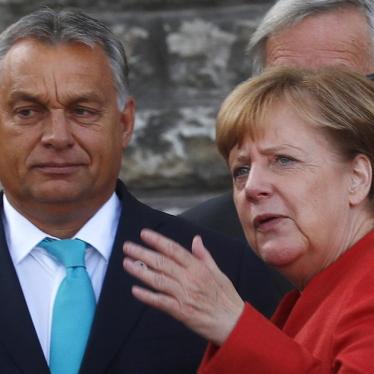In September, it seemed as if the European Union had finally woken up to the threat that Hungary’s Fidesz government poses to the rights of Hungarian citizens, democratic institutions, and shared values of the EU, when the European Parliament voted to launch political sanctions.
But since then the EU Council, made up of member state governments, has dragged its feet even as the situation in Hungary worsens.
In a debate on Hungary yesterday, members of the European Parliament called out the lack of progress by the Council on the political sanctions process under article 7 – the EU treaty mechanism for dealing with EU governments that put the union’s values at risk. They criticized the previous Austrian presidency for not prioritizing the issue and expressed concerns about the commitment of Romania – now holding the presidency – to moving the process forward. At yesterday’s debate, Commission Vice-President Frans Timmermans rightly raised alarms about new developments and urged the Council to take them seriously.
The European Parliament has good reason to be concerned.
Since September, Hungary’s government has used its two-thirds majority in parliament to adopt a so-called “slave law”that could force employees to work longer hours and have pay docked if they refuse. And it has created a new court system– over which it will likely yield heavy influence – for hearing claims against the government. Both laws were fast tracked through parliament with little public debate or consultation.
In addition, the government put further restrictions on the right to protest and side-stepped competition and monopoly laws to enable the merger of more than 400 media outlets into one government loyal media conglomerate.
The adoption of the slave law triggered massive nationwide protests which morphed into broader calls for a free press, an end to corruption, and independent courts. But the government has refused to listen, relying instead on its long-term strategy to stir up anti-migrant sentiment to try to change the conversation.
Hungary’s citizens protesting their government’s attack on democratic institutions deserve the solidarity of EU institutions and governments. That means the Council should stop delaying and hold Hungary’s government to account under the article 7 process.
Ahead of crucial European elections this May, EU institutions should send a clear signal that the EU is willing to defend its values and the rights of EU citizens.









